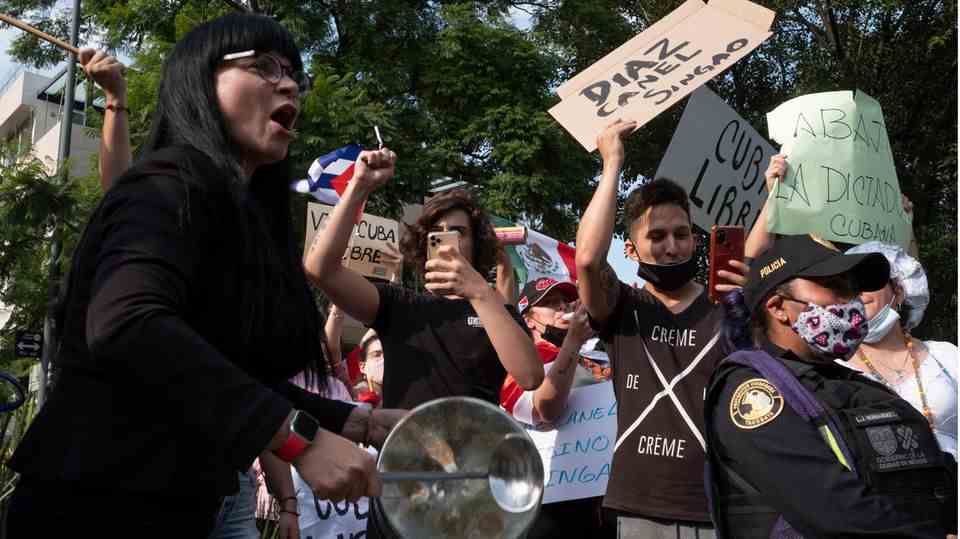prison camp in Cuba
US releases two Pakistanis from Guantanamo after 20 years in prison without charge
Camp Justice is what the Americans call the complex at the Guantánamo Bay naval base in Cuba, where the fate of the arrested terrorist suspects is decided.
© Alex Brandon/AP/DPA
Abdul and Mohammed Rabbani had been held at Guantánamo Bay military prison in Cuba since 2004. Now the US has brought them back to their native Pakistan. They had never accused the brothers.
US authorities have returned two brothers from Pakistan to their home country after the men were held in Cuba’s Guantanamo Bay military prison for almost two decades. Abdul and Mohammed Rabbani have been repatriated to Pakistan after it was determined their detention was no longer necessary to protect the United States from “an ongoing, significant threat,” the US Department of Defense said.
Both brothers were arrested in Pakistan in 2002 and taken to Guantanamo in 2004. During their nearly 20-year incarceration in the controversial prison on a US military base, they were never charged with a crime.
Brothers accuse US of abuse
Born in 1967, Abdul Rabbani was considered one of the oldest Guantánamo inmates. US authorities had accused him of working for the suspected mastermind of the September 11 attacks, Khalid Sheikh Mohammed, and of running a safehouse for the al Qaeda terrorist network in Karachi, Pakistan. However, an assessment revealed that he was said not to have had “specific insight into al Qaeda’s operational plans.”
Born in 1969, Mohammed is accused of having recruited his older brother for extremist circles. He is also said to have organized travel and financial means for Khalid Sheikh Mohammed and Abd al-Rahim al-Naschiri. Al-Naschiri, who is also imprisoned in Guantánamo, is considered to be the mastermind behind the attack on the US guided missile destroyer “USS Cole” in 2000, which killed 17 people.
The brothers said they were tortured in CIA custody before being transferred to Guantanamo. According to the Associated Press, US military records describe the pair providing little valuable information or retracting statements made during interrogation on the grounds that they were obtained through physical abuse.
165 acres
Space for 40,000 inmates: This is El Salvador’s new mega prison
“The United States appreciates the willingness of the government of Pakistan and other partners to support ongoing U.S. efforts to responsibly reduce the number of detainees and permanently close the Guantanamo Bay facility,” the Pentagon said. Earlier this month, Washington released another Guantanamo detainee, Majid Khan, and transferred him to Belize.
Khan was convicted of terrorism offenses in 2012 and has served his sentence. He lived in the United States from 1996 to early 2002 and is believed to have joined al Qaeda after the September 11, 2001 attacks and assisted the terrorist group in planning attacks in the United States and elsewhere.
Guantánamo is considered a symbol of violations of law by the USA after 9/11
After the release of Abdul and Mohammed Rabbani, there are now 32 inmates at Guantánamo. According to the Pentagon, 18 of them are eligible for transfer to their homeland if they are willing to take them in, and three for periodic review. At its peak in 2003, the prison held about 600 people classified as terrorists by the United States.
The administration of then President George W. Bush set up the prison camp after the attacks of September 11, 2001 – originally to interrogate suspects in the fight against terror outside of American jurisdiction. However, the inmates were held indefinitely, many without charge or trial, and were reportedly subjected to torture. Over time, Guantánamo has therefore become an international symbol of post-9/11 US violations of the law.
During his election campaign, Bush’s successor, Barack Obama, announced that he would close Guantanamo, but he didn’t keep his promise during his eight-year term in office because he didn’t have the necessary majority in the US Congress to do so. UN experts called for the prison to be closed in 2022, saying there had been “continued human rights violations”.
Sources: U.S. Department of Defense, CNN, Associated PressAFP




